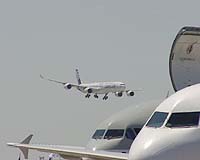 |
Kuala Lumpur (AFP) June 9, 2009 Airline executives Tuesday expressed hope of a turnaround next year after fresh estimates showed they may lose close to 20 billion dollars from 2008 to 2009 due to the global economic slowdown. With oil prices threatening to rise on expectations of a US-led economic turnaround, delegates to the annual meeting of the International Air Transport Association (IATA) said some carriers may start making money in late 2010. And some saw China, and its massive export-based economy, as a crucial engine of growth for the stalling industry. "In our view, we see recovery towards end of 2010. We think recovery will start there," said Alan Joyce, chief executive of Australia's Qantas. "Our regional operations are holding well. Our long-haul is losing money," he told fellow members of IATA, which represents 230 airlines accounting for 93 percent of scheduled international air traffic. "The Japanese market is particularly weak. Swine flu is having an impact," said Joyce. IATA chief economist Brian Pearce told AFP that the Asia-Pacific region, which is forecast to lose 3.3 billion dollars in 2009, or more than a third of global losses, may see a recovery next year, with Europe lagging other regions. He said government spending to stimulate consumption would help airlines. "The US and North American markets will come out earlier than Europe," he said. Pearce added that during such a stormy period, "airlines would love to merge but restraints on ownership will prevent it." "You will see alliances and coordination by airlines to cut costs." Tony Tyler, chief executive of Cathay Pacific Airways, said "let's not forget when we recover we are recovering from a very bad base, and it will be some time before we are back to where we were." "I'm afraid we are in for a long haul. We are not going to see instant recovery," he told a news conference. "The global economic meltdown is hitting the aviation industry hard. A toxic combination of low fares, a large drop in premium travel, and weak cargo loads is hitting the bottom line hard," he added. Malaysia Airlines managing director Idris Jala said recovery will begin when China's factories begin to increase output and air freight volumes, which have contracted sharply, rise as a result. "When China starts to produce more and more goods, you will begin to see an upturn," he told reporters at the end of the two-day meeting. He also said the industry was facing a "quadruple squeeze", referring to a fall in demand, losses on fuel hedging, the removal of fuel surcharges on consumers and the swine flu scare. IATA director general Giovanni Bisignani said Monday the industry may lose nine billion dollars in 2009, almost double an estimate just three months ago, making the crisis worse than the aftermath of the September 11, 2001 attacks in the United States. Combined with a revised estimate that it lost 10.4 billion dollars in 2008, the industry now looks set to lose almost 20 billion dollars over two years. Bisignani also warned against the possibility of a new oil price hike. "The risk that we have seen in recent weeks is that even the slightest glimmer of economic hope sends oil prices higher. Greedy speculation must not hold the global economy hostage," he said. The IATA says the industry's fuel bill is forecast to decline by 59 billion dollars to 106 billion dollars in 2009 based on an average price of 56 dollars per barrel for Brent North Sea crude during the year. On Tuesday, the Brent contract for July was above 68 dollars, nearly double the level in December when oil prices hit bottom. The price of New York light sweet crude, the global benchmark, also held above 68 dollars a barrel Tuesday after rebounding from overnight falls. It had fallen toward 32 dollars in December from a peak of 147 dollars in July. Share This Article With Planet Earth
Related Links Aerospace News at SpaceMart.com
 Airlines wary of IATA's 2020 carbon-neutral target
Airlines wary of IATA's 2020 carbon-neutral targetKuala Lumpur (AFP) June 9, 2009 Crisis-hit airlines said Tuesday that a plan to cap the growth of the industry's emissions by 2020 was ambitious and costly but agreed on the urgency of fighting climate change. "It's a very ambitious target, I keep my fingers crossed," Qatar Airways chief executive Akbar Al Baker told fellow delegates to the annual meeting of the International Air Transport Association (IATA). "I'm not ... read more |
|
| The content herein, unless otherwise known to be public domain, are Copyright 1995-2009 - SpaceDaily. AFP and UPI Wire Stories are copyright Agence France-Presse and United Press International. ESA Portal Reports are copyright European Space Agency. All NASA sourced material is public domain. Additional copyrights may apply in whole or part to other bona fide parties. Advertising does not imply endorsement,agreement or approval of any opinions, statements or information provided by SpaceDaily on any Web page published or hosted by SpaceDaily. Privacy Statement |